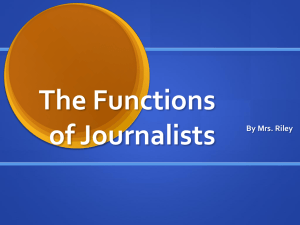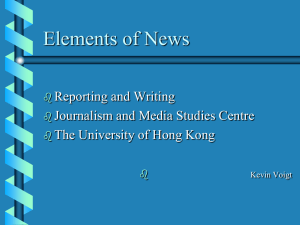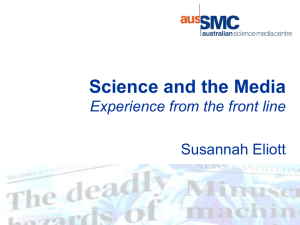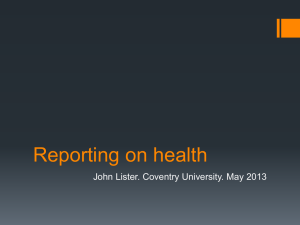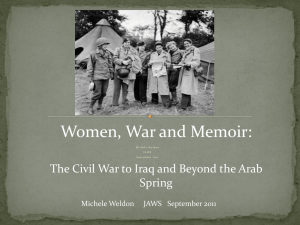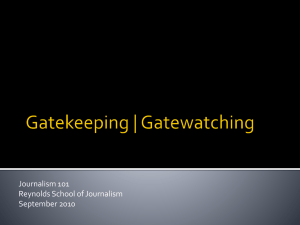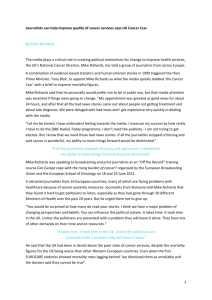PRESENTATION TOPICS
advertisement
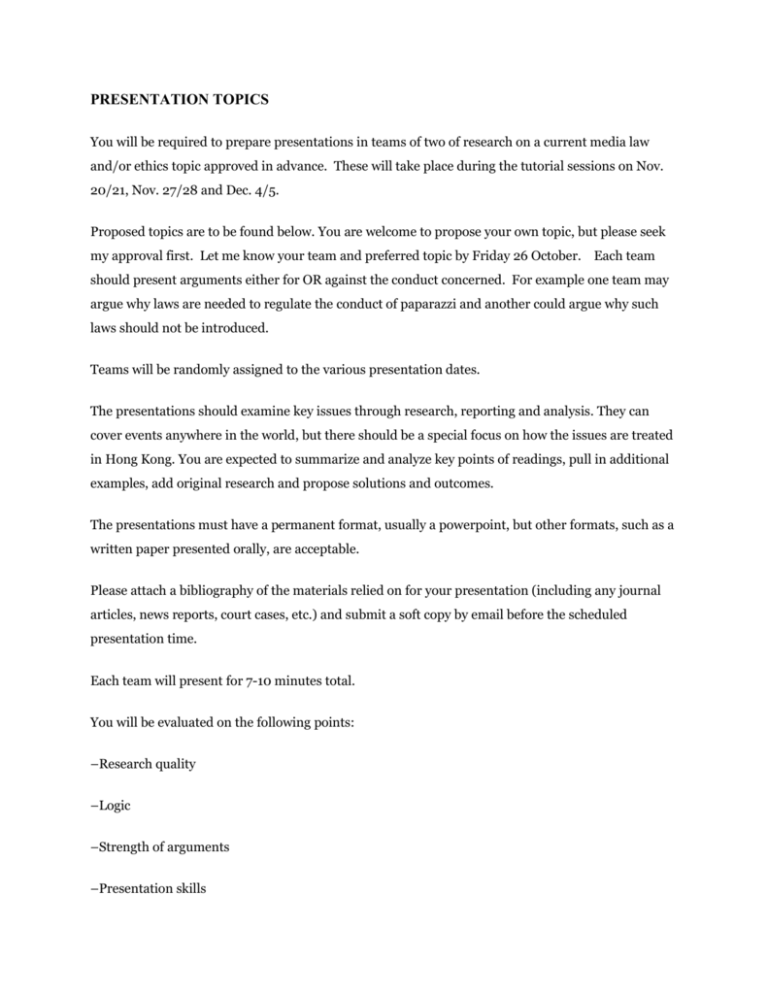
PRESENTATION TOPICS You will be required to prepare presentations in teams of two of research on a current media law and/or ethics topic approved in advance. These will take place during the tutorial sessions on Nov. 20/21, Nov. 27/28 and Dec. 4/5. Proposed topics are to be found below. You are welcome to propose your own topic, but please seek my approval first. Let me know your team and preferred topic by Friday 26 October. Each team should present arguments either for OR against the conduct concerned. For example one team may argue why laws are needed to regulate the conduct of paparazzi and another could argue why such laws should not be introduced. Teams will be randomly assigned to the various presentation dates. The presentations should examine key issues through research, reporting and analysis. They can cover events anywhere in the world, but there should be a special focus on how the issues are treated in Hong Kong. You are expected to summarize and analyze key points of readings, pull in additional examples, add original research and propose solutions and outcomes. The presentations must have a permanent format, usually a powerpoint, but other formats, such as a written paper presented orally, are acceptable. Please attach a bibliography of the materials relied on for your presentation (including any journal articles, news reports, court cases, etc.) and submit a soft copy by email before the scheduled presentation time. Each team will present for 7-10 minutes total. You will be evaluated on the following points: –Research quality –Logic –Strength of arguments –Presentation skills PRESENTATION TOPICS 1) HIDDEN CAMERA/UNDERCOVER REPORTING The phone-hacking scandal in the UK has sparked much debate about methods used by journalists to obtain iformation. What constitutes deception? Is the use of hidden cameras or microphones considered deception? Are there circumstances under which deception is appropriate conduct for a journalist? If not, why not? If there are, what are they and how are they justifiable? What impact do such tactics have on the public perception of investigative journalism? AGAINST: 2) USE OF STOLEN INFORMATION OR OTHER BREAKING OF THE LAW The WikiLeaks affair has focused attention on the publication of “confidential” material. Under what circumstances can use of unauthorised information or materials be justified in the pursuit of a story? Can a journalist be ethical and break the law? What is the impact on journalism and public perceptions if theft is allowed? Or not allowed? What obligations, if any, do editors have to ensure that reporters do not violate the law? What if the information is not stolen by a reporter, who merely receives the “unauthorised” information? FOR: AGAINST: 3) PUBLISHING PRIVATE FACTS OF A PUBLIC FIGURE The publication of private facts concerning public figures has recently provoked much controversy in Hong Kong, whether it is former senior official Henry Tang and his making of “mistakes” in his marriage or ex-chief executive Donald Tsang’s purchase of a luxury flat in Shenzhen. When movie star Arnold Schwarzenegger ran for governor of California in 2003, the Los Angeles Times newspaper ran a lengthy news article just before the election detailing allegations by several women that he had “groped” them or in other ways sexually harrassed them. The newspaper was criticised for running these articles to influence the election. Should newspapers run these kinds of stories? Why or why not? What other circumstances should there be for publishing or not publishing private facts of public indiviuals including celebrities, politicians and others? FOR: FOR: Tong Tsz Ching/Man Fung Nga (Tues) AGAINST: Haruka Nuga/Ishita Desai (Tues) 4) POLITICAL PARTICIPATION BY JOURNALISTS? Last year, hundreds of journalists joined a protest against police restrictions on covering the visit to Hong Kong of China’s Vice Premier Li Keqiang. During the Article 23 controversy in Hong Kong, (over proposed new national security laws) which led up to the July 1, 2003, protest by 500,000 people, many journalists debated how involved, if at all, they should be in the political process. Apple Daily provided posters for protesters and many journalists participated in the protest. Should journalists be active participants in the political process? What about news organisations? FOR: Peter Morris/Sham Wai Lun (Tues) AGAINST: 5) BLOGGERS/CITIZENS: ARE THEY JOURNALISTS? Increasingly, questions of law and ethics are being asked about bloggers (individuals with personal opinion websites) and citizens who use social media to post photos and information. Should they be considered journalists? What are the issues and arguments for considering whether a blogger or other citizens should be considered a journalist? Should they be regulated? FOR: Jee Hee Lim/Kadri Karolin Kouts (Tues) AGAINST: Phoebe Yuen/Catherine Ren (Tues) Amy Ha Lam Ki/Hui Yi Fong (Weds) 6) PUNISHING PAPARAZZI? Photographers have long been criticised for being overly aggressive in their coverage of the news. But how far should the government go in regulating them? Should there be “antipaparazzi” laws for media intrusion? FOR: Ng Wai-In (Tues) AGAINST: Naushin Ahmed (Tues) 7) USE OF ANONYMOUS SOURCES The media worldwide have been increasingly criticised for their use of anonymous sources. Critics say, for example, that anonymous sources used by the New York Times resulted in the publishing of erroneous information about Iraq’s weapons of mass destruction. But defenders of this practice say it is sometimes the only way to get information and are willing to go to jail to defend the use of them. What, if any, should be the boundaries for the use of anonymous sources. FOR: AGAINST:



